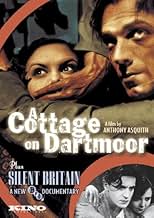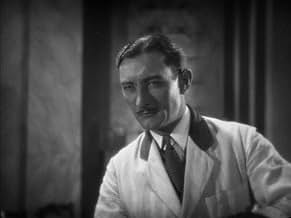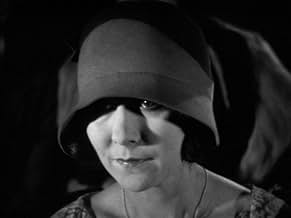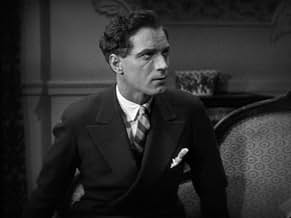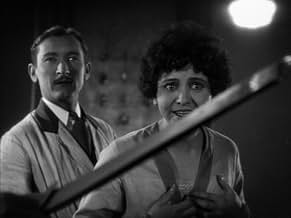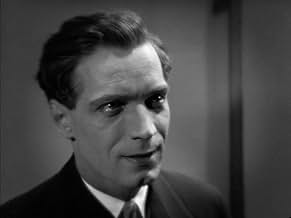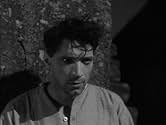IMDb RATING
7.5/10
1.3K
YOUR RATING
A former barber escapes from a high security prison. Flashback story of an escape from the lonely, high-security Dartmoor Prison.A former barber escapes from a high security prison. Flashback story of an escape from the lonely, high-security Dartmoor Prison.A former barber escapes from a high security prison. Flashback story of an escape from the lonely, high-security Dartmoor Prison.
- Director
- Writers
- Stars
- Director
- Writers
- All cast & crew
- Production, box office & more at IMDbPro
Featured reviews
From time to time, it is very laudable for this German count to re-watch some of those silent films of his aristocratic youth. Overall, this in order to check if the passage of time has positively or negatively influenced his recollection of the remarkable aspects of such films. That's not to mention that fortunately many of those films after such long time are now cleaned and restored -- nothing in common with those rotten and blurred nitrates that are stored at this Herr Graf's gloomy cellar that necessarily need an extra pair of monocles each time that they are shown at the Schloss theatre.
This time such advisable aristocratic and nostalgic film habits had excellent artistic results. That's because after 70 years from its official release, "A Cottage On Dartmoor", a film directed by Herr Anthony Asquith, preserves intact its many and excellent virtues. The perfect word that summarizes the merits of that British film: virtuosity.
Herr Anthony Asquith skillful film direction begins as the films starts. It introduces a convict that escaped from prison running away along Dartmoor meadows. With the sole purpose of revenge, he tries to find the girl that causes him imprisonment; when finally he finds her, a fascinating flashback starts.
A superb display of film technique can be seen in the film. There are such as perfect images ( Expressionism influences are obvious in the film, in its obscure and visual conception ) concatenations or fascinating visual metaphors ( the use of the camera is astounding: remarkable and imaginative camera angles that scrutinizes the tormented soul and evil intentions of the main character of the film ). It depicts an intriguing, thrilling and original story. A barber, Joe ( Herr Uno Henning ) falls in love with a manicurist, Sally ( Dame Norah Baring ) in the same place where both work. Joe is rejected by her and doesn't accept that ultimately Sally loves a client, Harry ( Herr Hans Adalbert Schlettow ). Consumed by jealousy, tries to murder Harry.
It has a perfect "tempo" in order to explain and show such a tormented love story that will finish with a poetic, sorrowful ending. Only one thing is lacking in seeing the film and is Dame Norah Baring's performance. Probably she is so stiff, inexpressive and frigid due to the abuse of the use of tea -- that awful beverage that usually is drunk by commoners and even eccentric aristocrats in the perfidious Albion. But that's a minor flaw that doesn't damage excessively the excellent artistic merits of such remarkable film.
And now, if you'll allow me, I must temporarily take my leave because this German Count must go to a decadent soirée pretty well-combed.
Herr Graf Ferdinand Von Galitzien http://ferdinandvongalitzien.blogspot.com/
This time such advisable aristocratic and nostalgic film habits had excellent artistic results. That's because after 70 years from its official release, "A Cottage On Dartmoor", a film directed by Herr Anthony Asquith, preserves intact its many and excellent virtues. The perfect word that summarizes the merits of that British film: virtuosity.
Herr Anthony Asquith skillful film direction begins as the films starts. It introduces a convict that escaped from prison running away along Dartmoor meadows. With the sole purpose of revenge, he tries to find the girl that causes him imprisonment; when finally he finds her, a fascinating flashback starts.
A superb display of film technique can be seen in the film. There are such as perfect images ( Expressionism influences are obvious in the film, in its obscure and visual conception ) concatenations or fascinating visual metaphors ( the use of the camera is astounding: remarkable and imaginative camera angles that scrutinizes the tormented soul and evil intentions of the main character of the film ). It depicts an intriguing, thrilling and original story. A barber, Joe ( Herr Uno Henning ) falls in love with a manicurist, Sally ( Dame Norah Baring ) in the same place where both work. Joe is rejected by her and doesn't accept that ultimately Sally loves a client, Harry ( Herr Hans Adalbert Schlettow ). Consumed by jealousy, tries to murder Harry.
It has a perfect "tempo" in order to explain and show such a tormented love story that will finish with a poetic, sorrowful ending. Only one thing is lacking in seeing the film and is Dame Norah Baring's performance. Probably she is so stiff, inexpressive and frigid due to the abuse of the use of tea -- that awful beverage that usually is drunk by commoners and even eccentric aristocrats in the perfidious Albion. But that's a minor flaw that doesn't damage excessively the excellent artistic merits of such remarkable film.
And now, if you'll allow me, I must temporarily take my leave because this German Count must go to a decadent soirée pretty well-combed.
Herr Graf Ferdinand Von Galitzien http://ferdinandvongalitzien.blogspot.com/
Firstly, let me say that my little lad eats the occasional rusk and loved them when a baby (now nearly 4). I loved this movie...I saw it for the first time last night on the BBC. I too enjoyed the flashback vehicle, which by using the exclamation (via title) "Joe!" jolted us into flashback. I thought the use of mirrors imaginative and symbolic (Norah appearing at times a disembodied - if beautiful - head among possessive men in the barbershop. I was quite enthralled by the big farmer coming in for a manicure (wink-wink). The images are on reflection quite disturbing in the barbershop...a man having his hands caressed by a pretty girl whilst a cut throat razor is applied to his throat. I too found the trip to the cinema memorable and also poignant. The director at pains to reveal to us the value of the cinema orchestra at a time when their jobs would have been in extreme peril. Couple this with mention of a "talkie" earlier (this received a blank response) and these elements could be viewed as a swan song for the silents. You must see this film, it is truly wonderful. The performances are spot on and it does not always take the predictable turn. Considering the intensity of obsession the male lead character conveys, the film develops great warmth. UNIQUE!!
First time of viewing this one: a marvellous experience, from the opening shots of a prisoner on the run over moorland from prison guards to the ending where
The first intertitle is "Joe!" and we're immediately launched into an hour long flashback of how Joe got to be a prisoner and how he knows Sally. He's obsessively in love with her with awful consequences for the man she really loves, and himself - realistically portrayed and apart from the incident in the barbers unfortunately only too believable. The three main leads play their parts wonderfully well with incessant close ups, inventive photography, low cameras and precise mirror shots highlighting the intensity. Photogenic Norah Baring thankfully was no Hollywood Queen, her self possession and simple youthful homeliness adding an extra dimension to the time honoured tale. Favourite bits: Life in Sally's boarding house with the old biddies, ear trumpets and ancient furniture and plants; The cinema segment with everyone including the redundant pit orchestra intently watching a talkie, and of course the orgasmic psycho-jazz snappy editing; The "murder" in the barbers (it was fun watching everybody apparently just watching the dying man dying).
One of the last mainstream silent films produced, it just couldn't have worked even one year later as a slave to the voice this shows exactly what silent films could offer as an artform, and still do to those with a little patience. Try it.
The first intertitle is "Joe!" and we're immediately launched into an hour long flashback of how Joe got to be a prisoner and how he knows Sally. He's obsessively in love with her with awful consequences for the man she really loves, and himself - realistically portrayed and apart from the incident in the barbers unfortunately only too believable. The three main leads play their parts wonderfully well with incessant close ups, inventive photography, low cameras and precise mirror shots highlighting the intensity. Photogenic Norah Baring thankfully was no Hollywood Queen, her self possession and simple youthful homeliness adding an extra dimension to the time honoured tale. Favourite bits: Life in Sally's boarding house with the old biddies, ear trumpets and ancient furniture and plants; The cinema segment with everyone including the redundant pit orchestra intently watching a talkie, and of course the orgasmic psycho-jazz snappy editing; The "murder" in the barbers (it was fun watching everybody apparently just watching the dying man dying).
One of the last mainstream silent films produced, it just couldn't have worked even one year later as a slave to the voice this shows exactly what silent films could offer as an artform, and still do to those with a little patience. Try it.
10sunlily
A Cottage on Dartmoor is a late British silent of stunning clarity and poetic justice. The use of the camera to caress the homey accents in Norah's boarding house, the use of mirrors to dramatize the lives and thoughts of the characters, the elongated camera angles of the escaped convict jumping from captivity to freedom, and running from his past into redemption. All of this and more make this late silent itself almost a valentine to the end of the silent era and the dawn of sound.
One of the most poignant scenes in the movie demonstrates this by taking us to a "talkie" that nonetheless has a full orchestra that the camera hones in on and romanticizes.
While this is a tale of obsession, it is also a story of love that has many emotionally tense elements that Norah Baring and Uno Henning handle with dignity and grace. I'm very surprised that I've not heard more about either of these actors.
A Cottage on Dartmoor is a very beautifully realized film that probably wouldn't have been as effective had it been made as a sound movie.
One of the most poignant scenes in the movie demonstrates this by taking us to a "talkie" that nonetheless has a full orchestra that the camera hones in on and romanticizes.
While this is a tale of obsession, it is also a story of love that has many emotionally tense elements that Norah Baring and Uno Henning handle with dignity and grace. I'm very surprised that I've not heard more about either of these actors.
A Cottage on Dartmoor is a very beautifully realized film that probably wouldn't have been as effective had it been made as a sound movie.
Sally lives in a cottage on Dartmoor when, on a dark and quiet night, a man breaks into her home having just escaped the high-security prison across the moors. That man is none other than Joe, a former barber's assistant at the place where Sally used to be a manicurist. As they connect eyes, the audience flashback to the times where Joe and Sally once worked together and he had tried to woo her at the beginning of a series of events that now brought them to this place.
The BBC's summer of British films this year turned out to be better than I expected it to be because, instead of wheeling out Zulu, Dam Busters and all the usual British films, they actually screened lots of films that I had not seen or, in some cases, heard of. Of course this meant that some of them were not any good but at least it was an attempt to fresh up the idea of what British cinema is. A Cottage on Dartmoor is a good example of this as it is rare for silent films to be screened on television and far more rare for them to be British silent films. I had never seen this and I enjoyed it a great deal.
Narrative-wise the film opens with an element of fear and tension before jumping back to more of a comedy and romance. As this builds back to where it started again for a good finish. The film is maybe 15 minutes too long for the material to sustain but otherwise it is well delivered. The funny bits are amusing, the tense bits tense and the romance nicely melodramatic and tragic, however it is the delivery that makes the film specifically that of Asquith and his cinematographer. Visually the film matches the tone of the film really well opening and closing with sharp shadows on the moors, and enjoying a bright and carefree air early in the barbershop scenes. The images are sharp and really well formed with plenty of clever shots. Mirrors are used well, conversations represented by stock footage, flashbacks delivered within flashbacks and a great scene where we watch a cinema audience reacting to a film they are watching. Visually and technically it is very impressive and I enjoyed it a great deal.
Deserves to be screened a lot more than it is and be seen by more people than it is, but credit to the BBC for showing it recently.
The BBC's summer of British films this year turned out to be better than I expected it to be because, instead of wheeling out Zulu, Dam Busters and all the usual British films, they actually screened lots of films that I had not seen or, in some cases, heard of. Of course this meant that some of them were not any good but at least it was an attempt to fresh up the idea of what British cinema is. A Cottage on Dartmoor is a good example of this as it is rare for silent films to be screened on television and far more rare for them to be British silent films. I had never seen this and I enjoyed it a great deal.
Narrative-wise the film opens with an element of fear and tension before jumping back to more of a comedy and romance. As this builds back to where it started again for a good finish. The film is maybe 15 minutes too long for the material to sustain but otherwise it is well delivered. The funny bits are amusing, the tense bits tense and the romance nicely melodramatic and tragic, however it is the delivery that makes the film specifically that of Asquith and his cinematographer. Visually the film matches the tone of the film really well opening and closing with sharp shadows on the moors, and enjoying a bright and carefree air early in the barbershop scenes. The images are sharp and really well formed with plenty of clever shots. Mirrors are used well, conversations represented by stock footage, flashbacks delivered within flashbacks and a great scene where we watch a cinema audience reacting to a film they are watching. Visually and technically it is very impressive and I enjoyed it a great deal.
Deserves to be screened a lot more than it is and be seen by more people than it is, but credit to the BBC for showing it recently.
Did you know
- GoofsJoe's coworker reaches down to pick up the movie tickets with his right hand, but the close-up shows his left hand grabbing them.
- ConnectionsFeatured in Loin de Hollywood - L'art européen du cinéma muet (1995)
Details
- Runtime
- 1h 28m(88 min)
- Color
- Sound mix
- Aspect ratio
- 1.20 : 1
Contribute to this page
Suggest an edit or add missing content

